+ Open data
Open data
- Basic information
Basic information
| Entry | Database: EMDB / ID: EMD-21174 | |||||||||
|---|---|---|---|---|---|---|---|---|---|---|
| Title | De novo designed icosahedral nanoparticle I53_dn5 | |||||||||
 Map data Map data | I53_dn5 Nanoparticle Map | |||||||||
 Sample Sample |
| |||||||||
 Keywords Keywords | De novo / Nanoparticle / DE NOVO PROTEIN | |||||||||
| Biological species | synthetic construct (others) | |||||||||
| Method | single particle reconstruction / cryo EM / Resolution: 5.35 Å | |||||||||
 Authors Authors | Antanasijevic A / Ward AB | |||||||||
| Funding support |  United States, 1 items United States, 1 items
| |||||||||
 Citation Citation |  Journal: Elife / Year: 2020 Journal: Elife / Year: 2020Title: Tailored design of protein nanoparticle scaffolds for multivalent presentation of viral glycoprotein antigens. Authors: George Ueda / Aleksandar Antanasijevic / Jorge A Fallas / William Sheffler / Jeffrey Copps / Daniel Ellis / Geoffrey B Hutchinson / Adam Moyer / Anila Yasmeen / Yaroslav Tsybovsky / Young- ...Authors: George Ueda / Aleksandar Antanasijevic / Jorge A Fallas / William Sheffler / Jeffrey Copps / Daniel Ellis / Geoffrey B Hutchinson / Adam Moyer / Anila Yasmeen / Yaroslav Tsybovsky / Young-Jun Park / Matthew J Bick / Banumathi Sankaran / Rebecca A Gillespie / Philip Jm Brouwer / Peter H Zwart / David Veesler / Masaru Kanekiyo / Barney S Graham / Rogier W Sanders / John P Moore / Per Johan Klasse / Andrew B Ward / Neil P King / David Baker /   Abstract: Multivalent presentation of viral glycoproteins can substantially increase the elicitation of antigen-specific antibodies. To enable a new generation of anti-viral vaccines, we designed self- ...Multivalent presentation of viral glycoproteins can substantially increase the elicitation of antigen-specific antibodies. To enable a new generation of anti-viral vaccines, we designed self-assembling protein nanoparticles with geometries tailored to present the ectodomains of influenza, HIV, and RSV viral glycoprotein trimers. We first designed trimers tailored for antigen fusion, featuring N-terminal helices positioned to match the C termini of the viral glycoproteins. Trimers that experimentally adopted their designed configurations were incorporated as components of tetrahedral, octahedral, and icosahedral nanoparticles, which were characterized by cryo-electron microscopy and assessed for their ability to present viral glycoproteins. Electron microscopy and antibody binding experiments demonstrated that the designed nanoparticles presented antigenically intact prefusion HIV-1 Env, influenza hemagglutinin, and RSV F trimers in the predicted geometries. This work demonstrates that antigen-displaying protein nanoparticles can be designed from scratch, and provides a systematic way to investigate the influence of antigen presentation geometry on the immune response to vaccination. | |||||||||
| History |
|
- Structure visualization
Structure visualization
| Movie |
 Movie viewer Movie viewer |
|---|---|
| Structure viewer | EM map:  SurfView SurfView Molmil Molmil Jmol/JSmol Jmol/JSmol |
| Supplemental images |
- Downloads & links
Downloads & links
-EMDB archive
| Map data |  emd_21174.map.gz emd_21174.map.gz | 224.9 MB |  EMDB map data format EMDB map data format | |
|---|---|---|---|---|
| Header (meta data) |  emd-21174-v30.xml emd-21174-v30.xml emd-21174.xml emd-21174.xml | 20.1 KB 20.1 KB | Display Display |  EMDB header EMDB header |
| Images |  emd_21174.png emd_21174.png | 217.8 KB | ||
| Masks |  emd_21174_msk_1.map emd_21174_msk_1.map | 244.1 MB |  Mask map Mask map | |
| Filedesc metadata |  emd-21174.cif.gz emd-21174.cif.gz | 6.2 KB | ||
| Others |  emd_21174_half_map_1.map.gz emd_21174_half_map_1.map.gz emd_21174_half_map_2.map.gz emd_21174_half_map_2.map.gz | 193.1 MB 193 MB | ||
| Archive directory |  http://ftp.pdbj.org/pub/emdb/structures/EMD-21174 http://ftp.pdbj.org/pub/emdb/structures/EMD-21174 ftp://ftp.pdbj.org/pub/emdb/structures/EMD-21174 ftp://ftp.pdbj.org/pub/emdb/structures/EMD-21174 | HTTPS FTP |
-Related structure data
| Related structure data | 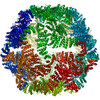 6vfjMC 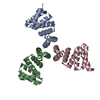 6v8eC 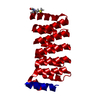 6vehC  6vfhC  6vfiC M: atomic model generated by this map C: citing same article ( |
|---|---|
| Similar structure data |
- Links
Links
| EMDB pages |  EMDB (EBI/PDBe) / EMDB (EBI/PDBe) /  EMDataResource EMDataResource |
|---|---|
| Related items in Molecule of the Month |
- Map
Map
| File |  Download / File: emd_21174.map.gz / Format: CCP4 / Size: 244.1 MB / Type: IMAGE STORED AS FLOATING POINT NUMBER (4 BYTES) Download / File: emd_21174.map.gz / Format: CCP4 / Size: 244.1 MB / Type: IMAGE STORED AS FLOATING POINT NUMBER (4 BYTES) | ||||||||||||||||||||||||||||||||||||||||||||||||||||||||||||||||||||
|---|---|---|---|---|---|---|---|---|---|---|---|---|---|---|---|---|---|---|---|---|---|---|---|---|---|---|---|---|---|---|---|---|---|---|---|---|---|---|---|---|---|---|---|---|---|---|---|---|---|---|---|---|---|---|---|---|---|---|---|---|---|---|---|---|---|---|---|---|---|
| Annotation | I53_dn5 Nanoparticle Map | ||||||||||||||||||||||||||||||||||||||||||||||||||||||||||||||||||||
| Projections & slices | Image control
Images are generated by Spider. | ||||||||||||||||||||||||||||||||||||||||||||||||||||||||||||||||||||
| Voxel size | X=Y=Z: 1.03 Å | ||||||||||||||||||||||||||||||||||||||||||||||||||||||||||||||||||||
| Density |
| ||||||||||||||||||||||||||||||||||||||||||||||||||||||||||||||||||||
| Symmetry | Space group: 1 | ||||||||||||||||||||||||||||||||||||||||||||||||||||||||||||||||||||
| Details | EMDB XML:
CCP4 map header:
| ||||||||||||||||||||||||||||||||||||||||||||||||||||||||||||||||||||
-Supplemental data
-Mask #1
| File |  emd_21174_msk_1.map emd_21174_msk_1.map | ||||||||||||
|---|---|---|---|---|---|---|---|---|---|---|---|---|---|
| Projections & Slices |
| ||||||||||||
| Density Histograms |
-Half map: I53 dn5 Nanoparticle Half-Map 1
| File | emd_21174_half_map_1.map | ||||||||||||
|---|---|---|---|---|---|---|---|---|---|---|---|---|---|
| Annotation | I53_dn5 Nanoparticle Half-Map 1 | ||||||||||||
| Projections & Slices |
| ||||||||||||
| Density Histograms |
-Half map: I53 dn5 Nanoparticle Half-Map 2
| File | emd_21174_half_map_2.map | ||||||||||||
|---|---|---|---|---|---|---|---|---|---|---|---|---|---|
| Annotation | I53_dn5 Nanoparticle Half-Map 2 | ||||||||||||
| Projections & Slices |
| ||||||||||||
| Density Histograms |
- Sample components
Sample components
-Entire : De novo designed nanoparticle of icosahedral symmetry I53_dn5_NP
| Entire | Name: De novo designed nanoparticle of icosahedral symmetry I53_dn5_NP |
|---|---|
| Components |
|
-Supramolecule #1: De novo designed nanoparticle of icosahedral symmetry I53_dn5_NP
| Supramolecule | Name: De novo designed nanoparticle of icosahedral symmetry I53_dn5_NP type: complex / ID: 1 / Parent: 0 / Macromolecule list: all Details: Self-assembling nanoparticle of icosahedral symmetry |
|---|---|
| Source (natural) | Organism: synthetic construct (others) |
| Molecular weight | Theoretical: 1.96 MDa |
-Macromolecule #1: I53_dn5B
| Macromolecule | Name: I53_dn5B / type: protein_or_peptide / ID: 1 / Number of copies: 1 / Enantiomer: LEVO |
|---|---|
| Source (natural) | Organism: synthetic construct (others) |
| Molecular weight | Theoretical: 15.356009 KDa |
| Recombinant expression | Organism:  |
| Sequence | String: MEEAELAYLL GELAYKLGEY RIAIRAYRIA LKRDPNNAEA WYNLGNAYYK QGRYREAIEY YQKALELDPN NAEAWYNLGN AYYERGEYE EAIEYYRKAL RLDPNNADAM QNLLNAKMRE ELEHHHHHH |
-Macromolecule #2: I53_dn5A
| Macromolecule | Name: I53_dn5A / type: protein_or_peptide / ID: 2 / Number of copies: 1 / Enantiomer: LEVO |
|---|---|
| Source (natural) | Organism: synthetic construct (others) |
| Molecular weight | Theoretical: 17.215148 KDa |
| Recombinant expression | Organism:  |
| Sequence | String: MGKYDGSKLR IGILHARWNA EIILALVLGA LKRLQEFGVK RENIIIETVP GSFELPYGSK LFVEKQKRLG KPLDAIIPIG VLIKGSTMH FEYICDSTTH QLMKLNFELG IPVIFGVLTC LTDEQAEARA GLIEGKMHNH GEDWGAAAVE MATKFN |
-Experimental details
-Structure determination
| Method | cryo EM |
|---|---|
 Processing Processing | single particle reconstruction |
| Aggregation state | particle |
- Sample preparation
Sample preparation
| Concentration | 1.9 mg/mL | |||||||||
|---|---|---|---|---|---|---|---|---|---|---|
| Buffer | pH: 7.4 Component:
Details: Fresh TBS buffer, 0.2um filtered, 0.06mM DDM detergent added immediately before freezing | |||||||||
| Grid | Support film - Material: CARBON / Support film - topology: HOLEY / Support film - Film thickness: 11 / Details: unspecified | |||||||||
| Vitrification | Cryogen name: ETHANE / Chamber humidity: 100 % / Chamber temperature: 283 K / Instrument: FEI VITROBOT MARK IV Details: 0.06mM DDM detergent (from an 8X stock) added immediately before freezing. | |||||||||
| Details | Nanoparticle was generated by co-expression of two components (A and B) in E coli. Assembled particles purified using a combination of Ni-affinity chromatography and gel filtration chromatography. |
- Electron microscopy
Electron microscopy
| Microscope | FEI TITAN KRIOS |
|---|---|
| Temperature | Min: 70.0 K / Max: 90.0 K |
| Image recording | Film or detector model: GATAN K2 SUMMIT (4k x 4k) / Detector mode: COUNTING / Number grids imaged: 1 / Number real images: 1548 / Average electron dose: 50.4 e/Å2 |
| Electron beam | Acceleration voltage: 300 kV / Electron source:  FIELD EMISSION GUN FIELD EMISSION GUN |
| Electron optics | Illumination mode: FLOOD BEAM / Imaging mode: BRIGHT FIELD / Cs: 2.7 mm / Nominal defocus max: 1.5 µm / Nominal defocus min: 0.6 µm / Nominal magnification: 29000 |
| Sample stage | Specimen holder model: FEI TITAN KRIOS AUTOGRID HOLDER / Cooling holder cryogen: NITROGEN |
| Experimental equipment |  Model: Titan Krios / Image courtesy: FEI Company |
+ Image processing
Image processing
-Atomic model buiding 1
| Details | Icosahedral nanoparticle I53_dn5 model was docked into a reconstructed map using UCSF Chimera and Rosetta relaxed refinement was applied to relax the model into the map. |
|---|---|
| Refinement | Space: REAL / Protocol: OTHER |
| Output model |  PDB-6vfj: |
 Movie
Movie Controller
Controller



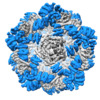












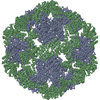
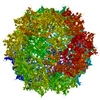
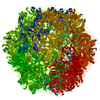
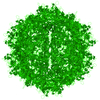
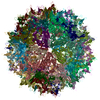
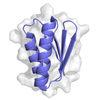
 Z (Sec.)
Z (Sec.) Y (Row.)
Y (Row.) X (Col.)
X (Col.)













































